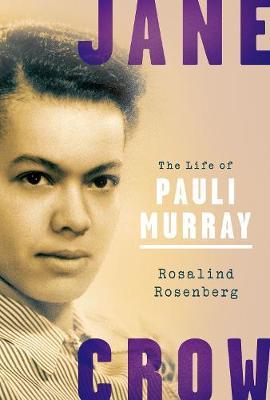Jane Crow

Jane Crow
A mixed-race orphan, Murray grew up in segregated North Carolina before escaping to New York, where she attended Hunter College and became a labor activist in the 1930s. When she applied to graduate school at the University of North Carolina, where her white great-great-grandfather had been a trustee, she was rejected because of her race. She went on to graduate first in her class at Howard Law School, only to be rejected for graduate study again at Harvard University this time on account of
her sex. Undaunted, Murray forged a singular career in the law. In the 1950s, her legal scholarship helped Thurgood Marshall challenge segregation head-on in the landmark Brown v. Board of Education case.
When appointed by Eleanor Roosevelt to the President's Commission on the Status of Women in 1962, she advanced the idea of Jane Crow, arguing that the same reasons used to condemn race discrimination could be used to battle gender discrimination. In 1965, she became the first African American to earn a JSD from Yale Law School and the following year persuaded Betty Friedan to found an NAACP for women, which became NOW. In the early 1970s, Murray provided Ruth Bader Ginsburg with the argument
Ginsburg used to persuade the Supreme Court that the Fourteenth Amendment to the Constitution protects not only blacks but also women - and potentially other minority groups - from discrimination. By that time, Murray was a tenured history professor at Brandeis, a position she left to become the first
black woman ordained a priest by the Episcopal Church in 1976.
Murray accomplished all this while struggling with issues of identity. She believed from childhood she was male and tried unsuccessfully to persuade doctors to give her testosterone. While she would today be identified as transgender, during her lifetime no social movement existed to support this identi
PRP: 235.10 Lei
Acesta este Prețul Recomandat de Producător. Prețul de vânzare al produsului este afișat mai jos.
211.59Lei
211.59Lei
235.10 LeiLivrare in 2-4 saptamani
Descrierea produsului
A mixed-race orphan, Murray grew up in segregated North Carolina before escaping to New York, where she attended Hunter College and became a labor activist in the 1930s. When she applied to graduate school at the University of North Carolina, where her white great-great-grandfather had been a trustee, she was rejected because of her race. She went on to graduate first in her class at Howard Law School, only to be rejected for graduate study again at Harvard University this time on account of
her sex. Undaunted, Murray forged a singular career in the law. In the 1950s, her legal scholarship helped Thurgood Marshall challenge segregation head-on in the landmark Brown v. Board of Education case.
When appointed by Eleanor Roosevelt to the President's Commission on the Status of Women in 1962, she advanced the idea of Jane Crow, arguing that the same reasons used to condemn race discrimination could be used to battle gender discrimination. In 1965, she became the first African American to earn a JSD from Yale Law School and the following year persuaded Betty Friedan to found an NAACP for women, which became NOW. In the early 1970s, Murray provided Ruth Bader Ginsburg with the argument
Ginsburg used to persuade the Supreme Court that the Fourteenth Amendment to the Constitution protects not only blacks but also women - and potentially other minority groups - from discrimination. By that time, Murray was a tenured history professor at Brandeis, a position she left to become the first
black woman ordained a priest by the Episcopal Church in 1976.
Murray accomplished all this while struggling with issues of identity. She believed from childhood she was male and tried unsuccessfully to persuade doctors to give her testosterone. While she would today be identified as transgender, during her lifetime no social movement existed to support this identi
Detaliile produsului











